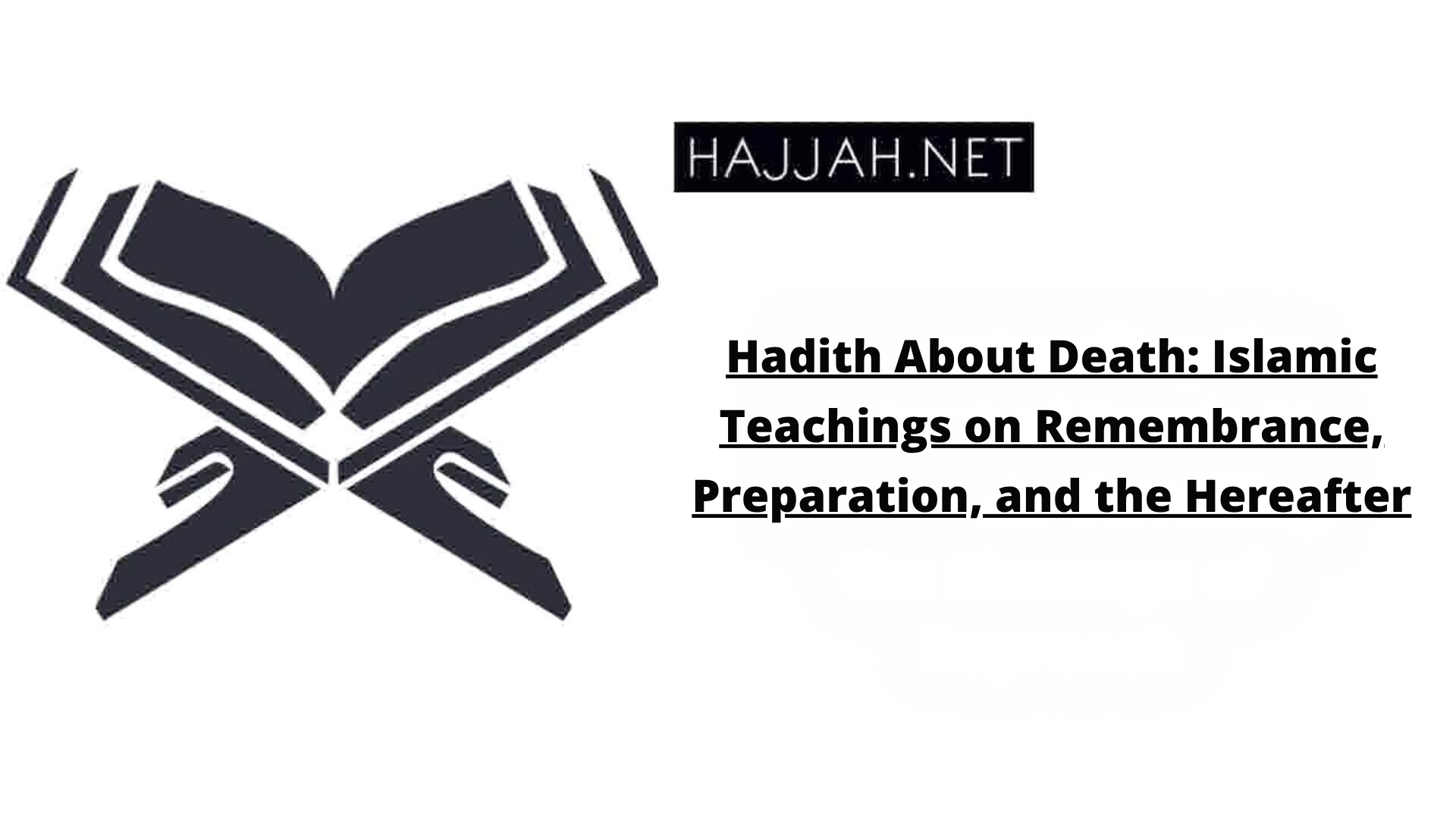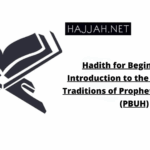Death (Al-Mawt) is an undeniable and universal reality that every soul will taste. In Islam, death is not viewed as a complete annihilation but as a profound transition from this temporary worldly life (Dunya) to the eternal life of the Hereafter (Akhirah). The Holy Quran and, significantly, the Hadith – the narrations of the sayings, actions, and approvals of Prophet Muhammad (peace and blessings be upon him) – provide extensive guidance, poignant reminders, and deep insights regarding death, its remembrance, preparing for it, and what follows. Reflecting on these Prophetic traditions helps believers cultivate a balanced perspective, live a more conscious and righteous life, and prepare for their ultimate meeting with Allah SWT (God).
This article explores key themes found in authentic Hadith about death.
The Islamic Perspective on Death
Islam teaches that life in this world is a test, and death is the gateway to accountability and the eternal abode – either Jannah (Paradise) for the righteous or Jahannam (Hellfire) for those who disbelieve or transgress without repentance. Death is a decree from Allah, its timing known only to Him.
Also Read
Key Themes in Hadith About Death
The Hadith literature is rich with narrations concerning various aspects of death:
1. The Importance of Remembering Death Frequently
Constantly remembering death is a highly encouraged practice in Islam, serving as a powerful spiritual catalyst.
- The Prophet Muhammad (PBUH) advised: “Remember often the destroyer of pleasures: death.” (Narrated by At-Tirmidhi, An-Nasa’i, Ibn Majah – Graded Hasan Sahih).
- Significance: This frequent remembrance helps to:
- Motivate righteous deeds and deter from sins.
- Encourage timely repentance (Tawbah).
- Reduce excessive attachment to worldly possessions and desires.
- Instill humility and a sense of urgency in preparing for the Hereafter.
- Bring contentment during hardship and caution during ease. As Ad-Daqqaaq said, “He who frequently remembers death will be granted three things: swift repentance, a content heart and enthusiasm to worship Allah; and the one who neglects remembering death will be afflicted with three things: delay in repentance, discontentment and laziness in worshipping Allah.”
2. Preparing for Death
Mindfulness of death naturally leads to preparing for it.
- When asked, “Which of the believers is the wisest?” The Prophet Muhammad (PBUH) replied: “Those who remember death often and have best prepared for it with good deeds; those are the wisest.” (Narrated by Ibn Majah – Graded Hasan).
- Significance: Preparation involves not just an abstract thought, but tangible actions:
- Fulfilling one’s obligations to Allah (Salah, Zakat, Sawm, Hajj if able).
- Striving to perform good deeds consistently.
- Seeking forgiveness for sins and rectifying wrongs committed against others.
- Preparing a will (Wasiyyah) if one has possessions.
- Living each day with the awareness that it could be one’s last, as advised by the Prophet (PBUH) to Ibn Umar: “Be in this world as if you were a stranger or a traveler on the road. In the evening, do not anticipate the morning, and in the morning do not anticipate the evening. Take from your health for your illness and from your life for your death.” (Sahih al-Bukhari).
3. Signs of a Good End (Husn al-Khatimah)
Certain signs at the time of death are considered indicators of a good end for a believer, by Allah’s mercy.
- The Prophet Muhammad (PBUH) said: “When Allah wills good for His slave, He uses him.” They asked, “How does He use him?” He said, “He guides him to do good deeds before he dies, then He takes his soul in that state.” (Narrated by At-Tirmidhi, Ahmad – Sahih). Another narration mentions Allah “sweetens him” by enabling him to do good before death.
- Other signs mentioned in various Hadith include:
- Dying while uttering the Shahada (La ilaha illallah).
- Sweating on the forehead at the time of death.
- Dying on a Friday night or Friday day.
- Dying as a martyr in the cause of Allah, or from certain illnesses like plague or stomach disease, or for a woman dying in childbirth.
- Significance: These signs offer hope and encourage believers to strive for a life of piety, hoping for Allah’s mercy and a blessed end.
4. The Soul’s Departure and the Experience of the Grave (Qabr)
Hadith provide vivid descriptions of the soul’s departure and the initial stages in the grave.
- The Angel of Death: The soul is taken by the Angel of Death, and its journey upwards is described differently for a believing soul versus a disbelieving soul. A good soul is welcomed by angels with fragrance and ascends to the heavens, while an evil soul is met harshly.
- The Questioning in the Grave: After burial, the deceased is visited by two angels, Munkar and Nakir, who will question them about their Lord, their religion, and their Prophet. (Tirmidhi – Hasan).
- The State of the Grave: The Prophet (PBUH) said: “The grave is either one of the gardens of Paradise or one of the pits of Hellfire.” (Tirmidhi – Da’if, but the concept is supported by other texts). This state is based on the individual’s deeds in life.
- Significance: These narrations emphasize the reality of accountability immediately after death and the importance of sound faith and righteous actions.
5. Deeds That Continue to Benefit the Deceased
While a person’s own deeds cease upon death, certain actions continue to bring them reward.
- The Prophet Muhammad (PBUH) said: “When a man dies, his deeds come to an end except for three things: Sadaqah Jariyah (ceaseless charity, e.g., building a mosque, digging a well, disseminating beneficial knowledge); a knowledge which is beneficial (that he taught or left behind); or a virtuous descendant who prays for him (for the deceased).” (Sahih Muslim).
- Significance: This encourages leaving a positive, ongoing legacy and highlights the profound impact of a righteous child’s Du’a for their parents.
6. Grief and Mourning in Islam
Islam acknowledges grief as a natural human emotion.
- The Prophet Muhammad (PBUH) himself showed grief, for instance, by shedding tears upon the death of his son Ibrahim, saying, “The eye weeps and the heart grieves, but we say only what pleases our Lord.” (Sahih al-Bukhari).
- However, Islam prohibits excessive mourning practices such as loud wailing, tearing clothes, or striking oneself, which display a lack of patience and acceptance of Allah’s decree.
7. The Believer’s Attitude Towards Death
- A believer should not wish for death due to worldly hardship but can ask Allah for what is best for them. The Prophet (PBUH) taught to say: “O Allah, keep me alive as long as life is good for me, and cause me to die when death is good for me.” (Sahih al-Bukhari, Sahih Muslim).
- For the righteous believer, death is seen as a transition to meet their Lord and receive their reward, a “gift to the believer” as mentioned in one Hadith (Tirmidhi).
Lessons and Reflections from Hadith on Death
The Prophetic traditions concerning death serve as powerful reminders:
- Life is Transient: This worldly existence is short and a period of testing.
- The Hereafter is Eternal: The true and everlasting life begins after death.
- Accountability is Certain: Every soul will be held accountable for its deeds.
- Preparation is Essential: One must actively prepare for the Hereafter through faith and righteous actions.
- Hope in Allah’s Mercy: While mindful of accountability, a believer always maintains hope in Allah’s vast mercy and forgiveness.
Conclusion
The Hadith about death provide profound wisdom and essential guidance for Muslims. They encourage a balanced perspective: to remember death frequently not to despair, but to live a more purposeful, righteous life in preparation for the inevitable journey to the Hereafter. These teachings inspire believers to strive for a good end, to leave behind a legacy of good deeds, and to maintain hope in Allah’s infinite mercy and the promise of Paradise. Regular reflection on these traditions helps keep the heart alive and focused on the ultimate goal.





